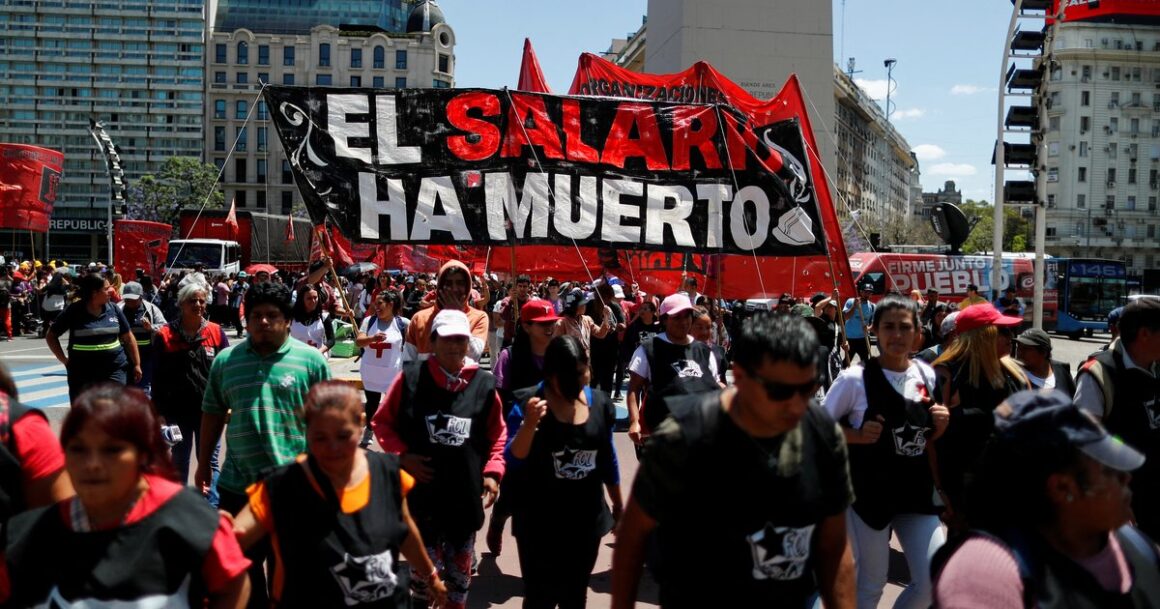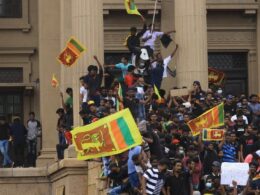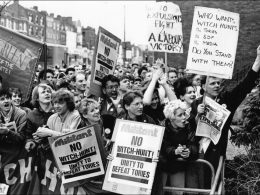By Marcos Ariel, International Socialist Alternative in Argentina
The economic, political and social crises are deepening at the same pace as the government and the IMF’s austerity measures. The constant currency devaluations and inflation lead to a greater degree of impoverishment of the working class and poor, while the passivity of the trade union confederations has now become complicity in this state of affairs. In an election year, the majority coalitions are in a deep crisis, which opens space for the dangerous far-right of Javier Milei to grow its electoral support. But the space is also opening up for the left, which with the Frente de Izquierda y de los Trabajadores — Unidad, FIT-U (Workers’ Left Front — Unity) at the head, can make electoral breakthroughs.
But this is not enough. We need a broad and united working-class political alternative that will spur mobilization and fight for a general strike, which is necessary to resist the austerity measures that will intensify whoever wins the elections.
When Alberto Fernández came to power, he did so as part of a grand coalition that brought together practically all the Peronist wings. Even sectors of the “popular left” joined together, with the idea of confronting the right-wing demon represented by former President, Macri. But the promises of reversing the disaster of Macri’s administration and filling the refrigerators with food were quickly forgotten. First with the excuse of the pandemic, then the imperialist war in Ukraine and most recently the great drought (the worst in 60 years).
The government has been granting more and more concessions to big business, such as pushing a constant devaluation and granting agro-exporters an exchange rate 50% above the official dollar. Meanwhile, the masses are being subjected to ever greater austerity that is expressed in the increase in the cost of living, which the meager salary and pension increases, located well below the rate of inflation, are far from covering. It is also seen in the cutbacks to social welfare with the reduction of thousands of social programs and the attack on the organizations of the unemployed who are resisting.
In that sense, in spite of the differences, there has been a continuity with the essence of the economic policy of the Macri government, aimed at guaranteeing the profits of the big capitalists and paying the illegitimate foreign debt to the IMF. This policy has led to an annual inflation rate of over 108% (the highest in 30 years) and according to a recent report by economists of the University of Buenos Aires, it could reach 200% if this trend continues. Thus, 40% of the population lives in poverty, which is worse among children and adolescents, reaching 60%. This despite the post-pandemic GDP and employment growth.
All the wage increases that the union bureaucracy quickly accepted in February-March have already been eaten up by inflation, which is why wages are below the poverty line, even for those who have a white-collar job. Not to mention precarious workers or the unemployed who live below the extreme poverty line.
Anger from below and bureaucratic passivity
This situation obviously generates enormous discontent in the working class. Although for the moment this is not expressed in big mobilizations to end austerity, there are several struggles, especially in the state health and education sectors. To a lesser extent, however, it is also expressed by workers in the private sector.
Why, in spite of the austerity and the general discontent, are there no massive mobilizations? We believe that there are two fundamental elements that act as a brake and containment of the widespread anger. In the first place, the betrayal of the trade union bureaucracies that not only dismissed outright a general strike, but also prioritized their deep connections to the ruling Peronist establishment, and did not call for any measure of struggle, no matter how minimal it may be. Only after 3 years of silence they issued a communiqué prior to May Day… supporting the government. They are afraid that any action could be seized upon by the class as a whole and they would lose control of the situation.
Secondly, we are entering a permanent election period where every month and practically every Sunday there are elections somewhere in the country. The uncertainty generated by the crisis of the majority coalitions led the provincial caudillos (powerful local establishment politicians) to separate the local elections from the national ones. This maneuver is giving them results, since in all provincial elections the ruling parties (whether Peronists or members of Juntos por el Cambio) are winning. But this is not only a tactic to maintain power in the provinces and municipalities. It also serves the objective of reinforcing in the working class the idea that voting is the only way to change the situation. In doing so they hope to undermine the notion that real change comes from mass mobilization. While this is paying dividends, the social situation is so critical that there is no guarantee that even the August presidential primaries pass without major turbulence. Let alone the general elections in October or the handover of power in December.
But in spite of this there are very important struggles being waged by sectors of the left opposition in the unions or sectors independent of the official bureaucracy. For example, among the education workers in the Province of Buenos Aires, the two-day strike called by the left opposition in the teachers’ union was successful, a struggle that continues with more strikes. In the province of Salta there is currently an important struggle of the education workers and there were recent struggles in the provinces of Córdoba, Chubut, Santa Fe, San Juan, among others.
There are also important struggles in the health sector such as those carried out by the nurses of Buenos Aires for the recognition of their role or that of resident doctors for better pay alongside other health sectors in the province. Currently the health workers of the province of Tucumán are on strike.
Although the private sector is where the betrayal of the union bureaucracy weighs most heavily, there are some important struggles such as that of the Coca Cola workers in the provinces of Salta and Córdoba. Among workers in the press, the SIPREBA, led by an independent leadership, managed to stop the massive layoffs in the Clarin newspaper. After an intense struggle, the tire workers’ union led by the Partido Obrero (Workers’ Party) achieved wage increases not only tied to the increase in inflation but 10 percentage points above it.
These are examples that where there is a struggle and a consistent leadership, not only can the austerity measures be stopped, but victories can be won. On the contrary, when you trust in the negotiating table and leave mobilization aside, you lose, as happened with the teachers and state workers in Mendoza who, after staging large mobilizations last year, the union led by Kirchnerism not only stopped the mobilization but did not achieve anything at the negotiating table. Mendoza teachers are among the worst paid in the country.
These are some examples that in spite of austerity, the working class is not defeated and there are great reserves of struggle. We need a new trade union leadership that advances the struggle not only in its own sector but also seeks to coordinate with other sectors, because the austerity measures can be stopped with a unified struggle.
The struggle of the unemployed: An example to follow
The ongoing struggle of the poorest sector of the working class, the unemployed, who are the main target of the government’s austerity measures, is inspiring and an example to follow. The government has already taken away from 100 thousand unemployed people the only financial aid they receive from the State. The objective is to reduce the subsidy to 400 thousand in total, which is what the IMF demands. This, in addition to the criminal cut in food deliveries to soup kitchens leaving thousands of people without food.
The Piquetero organizations of the unemployed led by the left are at the head of the resistance to the austerity measures and have formed a coordination called the Unidad Piquetera which decides on the different actions of struggle. Now they have taken a very important step by extending the coordination to the UTEP (Union of Popular Economy Workers) which brings together many of the groups of unemployed who support the government but who see how the austerity measures also affect them. As a first united action, on May 18 there was a huge day of protest in Buenos Aires with delegations of unemployed people coming from all over the country. This is an example to be followed in all other sectors of the working class. In order to resist the austerity measures, unity in struggle is necessary not only among those of us on the left, but also with sectors that today are still part of the government’s social base but are beginning to come out to fight.
More struggles are on the horizon. The central unions must break with their support for the government and call strikes to defend our wages. We cannot wait for the elections or the change of government. We are suffering austerity now, which is why we need urgent emergency measures. It is necessary to coordinate all the struggles to advance mobilization and build a general strike. Because regardless of who wins the elections, the road map is the same: a greater attack on the working class and paying the foreign debt no matter what.
The crisis is liquidating the capitalist coalitions
The social crisis is reflected in the political crisis of the two capitalist coalitions that governed the country during the last years, which are now creaking in the midst of fierce internal struggles that express different views on the pace of the austerity measures necessary to comply with the IMF.
The Peronist Frente de Todos (FdT) is suffering a constant loss of popular support and is going through an internal struggle between the sectors represented by Cristina Fernandez Kirchner, the Minister of Economy, Sergio Massa and Alberto Fernandez, all confronting each other. They know that if they lose the presidential elections it is the end of the FdT and the leadership of Peronism in the next period is at stake. The government is passing through the last months in the same way as Macri did at the end of his term of office: trying to get there with its last breath. The difference is that the latter had the support of the IMF, which disbursed the 44 billion dollars needed to sustain itself. Now Alberto Fernández is begging the Fund to send 10 billion dollars so that the country does not end up falling apart. If this loan is granted, it will be at the cost of stepping up the pace of austerity measures before the elections.
Alberto Fernandez’s candidacy has come to an end and he had to give up the fantasy of running for reelection. But this did not close the crisis. Not only do they still have no candidate for president but they do not know how to choose one either. On the one hand, Alberto sees the opportunity to “bury 20 years of Kirchnerism” and wants the candidate to emerge from the primary elections, betting that it will be Daniel Scioli. Scioli is a former candidate for president supported by Cristina in the 2015 presidential elections (but lost to Mauricio Macri) and current ambassador to Brazil who had a very good relationship with Bolsonaro. He is a candidate of the Peronist right.
On the other hand, Cristina, who tries to show that she has nothing to do with the austerity measures (as if she were not part of the government) has excluded herself from the electoral competition and her close confidant Axel Kicillof, current governor of the Province of Buenos Aires, prefers to relax rather than compete for the presidency of the country. However, they are not sure of winning here either, since according to the latest polls they are also losing a lot of votes. That is why Kicillof wants to separate the provincial elections from the national ones as most of the governors did, so as not to be tied to a defeat of the FdT in the presidential elections. Apparently, Cristina’s main wager is that the candidate will be the Minister of Economy Sergio Massa, a candidate that wanes with each new inflation figure that rises month after month. Both Alberto’s and Cristina’s candidates are from the Peronist right wing. Will the progressive sectors of the FdT once again vote for a right wing candidate so that another right wing candidate does not win?
Then again, the right-wing opposition coalition Juntos por el Cambio, Together for Change (JxC) is also in a deep crisis. The 2019 electoral defeat and the questioned internal leadership of Macri, who also had to step down from the election, has led to a fragmentation of the coalition, with different sectors seeking to seize the candidacy for president. This internal struggle hinders them from taking advantage of Peronism’s debacle and, according to the latest polls, they too are losing votes to the ultra-right Javier Milei, whose growth may condemn Peronism to third place leaving us to choose between two reactionary options in the run-off.
Regardless of how the electoral results turn out, what is certain is that the bi-coalitionism — with which the system ruled the last two decades after the destruction of the two-party system in the rebellion of 2001 — is in a terminal state, with the aggravating factor that the system still has no political alternative to replace it.
The Ultra-Right Wing Milei is Growing — a Serious Danger to be Faced
Milei, in spite of his growth in the polls, is not the main candidate of big business who, although they agree with his program, do not see him as having the capacity to implement it without unleashing a general rebellion. That is why after the annual summit of the richest businessmen of the country at the “Hotel Llao Llao” they were somewhat lukewarm towards Milei.
His figure expresses dissatisfaction with the main coalitions and with the “political class” in general rather than sympathy for his program, which includes everything from the free bearing of arms, the sale of organs, the privatization of education, the elimination of all labor laws and even dollarization. For the moment he does not have the capacity to mobilize his base nor does he have a national political apparatus, something which is clear in the provincial elections where he is having terrible results, to the point that he has had to withdraw support for his local candidates. But in spite of this, he continues to grow in the polls and for this reason it cannot be discarded that he may enter the run-off and even win. Anything is possible in the midst of the political crisis.
This is precisely why we should not underestimate him. Besides, we must take into account that he also expresses a phenomenon that is taking place worldwide, which is the growth of the far-right. In that sense, Milei is not a bolt from the blue. An eventual ultra-right government would mean a setback for the working class and although there are great reserves of energy to confront it on the political level, there is not for the moment a mass political alternative of the working class that can confront it as it is necessary.
Frente de Izquierda — Unidad — Between Opportunities and Internal Struggles.
Although we do not yet have the political alternative we need, we do have a very important electoral alternative in the Frente de Izquierda y los Trabajadores — Unidad (Left and Workers Front — Unity) which must be supported so that it continues to achieve parliamentary gains. Although for the moment it shows no signs of wanting to leave its comfort zone and advance towards the formation of a greater political force that, based on the unity achieved, advances towards the building of the broad and united political alternative that the working class needs.
Unfortunately, the FIT-U is also caught up in internal disputes which, if they continue, will prevent it from taking full advantage of the space that is opening up in the face of the debacle of Peronism. It is a mistake to see this space as something merely electoral, dissociating it from the class struggle, as unfortunately the various parties that make up the FIT-U are doing.
Their electoralist approach is leading them to a crisis where natural differences are taking a qualitative leap towards confrontations and public accusations, not only in the various party publications but also in the bourgeois media. That is why there is still no presidential candidate of the FIT-U, wasting valuable time to compete with the capitalist candidates. The seriousness of this internalism is expressed in the provincial elections where in some provinces the parties that make up the FIT-U go in a unitary list, and in others they go to disputed internal elections, assembling internal alliances that later break up and are changed in the province next door. Reaching the extreme in the province of Salta where the Front split directly with the MST and Partido Obrero on one side and the PTS on the other. If they had gone united they could have won a deputy. Likewise, for the May Day event held in Buenos Aires they had to sign a prior agreement in order to prevent speakers from attacking each other, which would have been an embarrassment.
The discussion that is pending is how, in the face of the debacle of Peronism and the rise of the ultra-right, the left can offer the working class a political tool greater than what currently exists in the form of FIT-U. The different parties that make up the FIT-U have a mechanistic analysis putting a sign of equality between the Peronist debacle and the growth of the left. There is no guarantee that, in the face of the government’s failure, the working class will automatically turn to vote and swell the ranks of the left. Without a political alternative — a bold approach that builds bridges and opens roads to fight alongside those who are already breaking with the government — it will be difficult to make this happen. The left will not only stagnate but may also begin to retreat.
It is true that votes can be gained from the failure of Peronism in the electoral sphere. This recently happened in the elections in the province of Jujuy, where the FIT-U obtained 12.81% of the votes, placing third and winning several deputies. But it does not mean that it will be permanent. If a more significant alternative for the working class does not appear, the bourgeois alternatives recompose as has happened in the past, for example in Mendoza where years ago the left led by the PTS held a great election, today all the positions won were lost. Even more so in the recent municipal elections, the FIT-U, divided into two lists, barely managed to overcome the proscriptive floor of 3% in a single municipality. Something similar also happened to the Partido Obrero in Salta, where it became a very important electoral reference, but once again the left lost all parliamentary positions.
While the left can have a good election, the Milei phenomenon, by appearing as a rebel and anti-establishment, also reduces space for the left. Underestimating it by seeing it only as an artificial creation of the media or just as a maneuver by the bourgeoisie to shift the axis of the campaign to the right, is to ignore Milei’s undeniable growth in public opinion.
Faced with future attacks against the working class, we need a working-class political alternative that, starting from the programmatic base of the FIT-U, has the capacity to create a movement, collective or unified party to act together on all fronts of struggle. A force that’s not only unified for the elections and nothing else, but that integrates the diversity of proposals and ideas that exist in the Argentine left. For this we believe it must be a broad movement that allows freedom of tendencies within it and attracts those layers that are beginning to break with the government or see the danger of the rise of the ultra-right. Starting from the points that unite us, such as the rejection of the IMF, united political actions could be carried out with many of those that may be in different electoral spaces for these elections, but that allows us to begin to look beyond the elections in order to organize ourselves to face IMF austerity.
If the left acts boldly, not only will it have a good election; more importantly, it can become a pole of attraction and reference for the Argentine working class and for the entire continent: fundamental to face the coming period.












